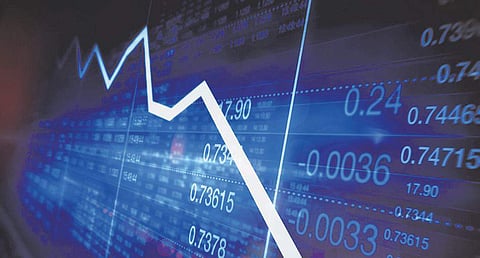

NEW DELHI: Panic-stricken stock markets across the world plunged into bear territory on Thursday after the World Health Organisation (WHO) officially declared the Covid-19 outbreak a pandemic. US President Donald Trump’s decision to impose a 30-day ban on travel from Europe only fanned rising fears over a global recession as countries begin imposing stringent restrictions on movement to contain the spread.
The day saw both the BSE Sensex and NSE Nifty suffer the largest absolute single-day decline in their history, breaking a record set just three days earlier. The Sensex closed the day down by a whopping 2,919.26 points (-8.18%) to end at 32,778.14 points and the Nifty slumped 8.3 per cent to close at 9,590.15 points, the lowest in two-and-a-half years. By the time the closing bell had rung, over Rs 11.27 lakh crore in investor wealth had been wiped out.
The sell-off in stocks spanned the industrial spectrum, with SBI (-13.23%), ONGC (-12.63%), Axis Bank (-12.27%), ITC (-11.07%) and Bajaj Auto (-9.79%) being the most impacted.
In the United States, lower circuit breakers were triggered, halting trade on both Wednesday and early Thursday as premier indices like the Dow Jones tanked. Eastern and European stock indices also saw a bloodbath, with London’s FTSE diving more than 9 per cent.
The sell-off also took a chunk out of the rupee which lost 49 paise to close at 74.17 per US dollar, while crude oil rates resumed their helter-skelter dive falling over 7 per cent in value as of 8 pm IST to trade at $33.23 per barrel.
This is the first time since 2015 that Indian stock exchanges have entered a bear market phase, generally defined as one where the market has lost over 20 per cent of its value from a recent high. After Thursday’s carnage, the Sensex has lost 22.5 per cent of its value from a lifetime peak of 42,273.87 achieved on January 20 this year, while the Nifty has declined by 22.84 per cent.
The current plunge into a bear market is also much steeper than the one in 2015, when the markets fell 25 per cent between March 2015 and February 2016. But it's not as large as the one following the global financial crisis in 2010, when Indian bourses had lost 28 per cent of their value before bottoming out.
Meanwhile, analysts warn that since the coronavirus pandemic is an ongoing crisis, it is unclear whether the markets have bottomed out. Some, like Deepak Jasani - Head Retail Research, HDFC Securities, note that markets are still not factoring in the risk adequately. “Recession risk is rising and the markets do not seem to be pricing that in fully. January was the third month in a row that the three-month measure of UK GDP showed zero growth, the weakest such run since the middle of 2009. In (Jan-Mar 2020), on an annualised basis, global growth could be deeply negative (-1%),” he warned.
The worst hit sectoral indices were BSE Oil & Gas (-9.82%), Realty (-9.5%), Metals (-9.39%), Bankex (-9.38%) and Finance (-8.98%).